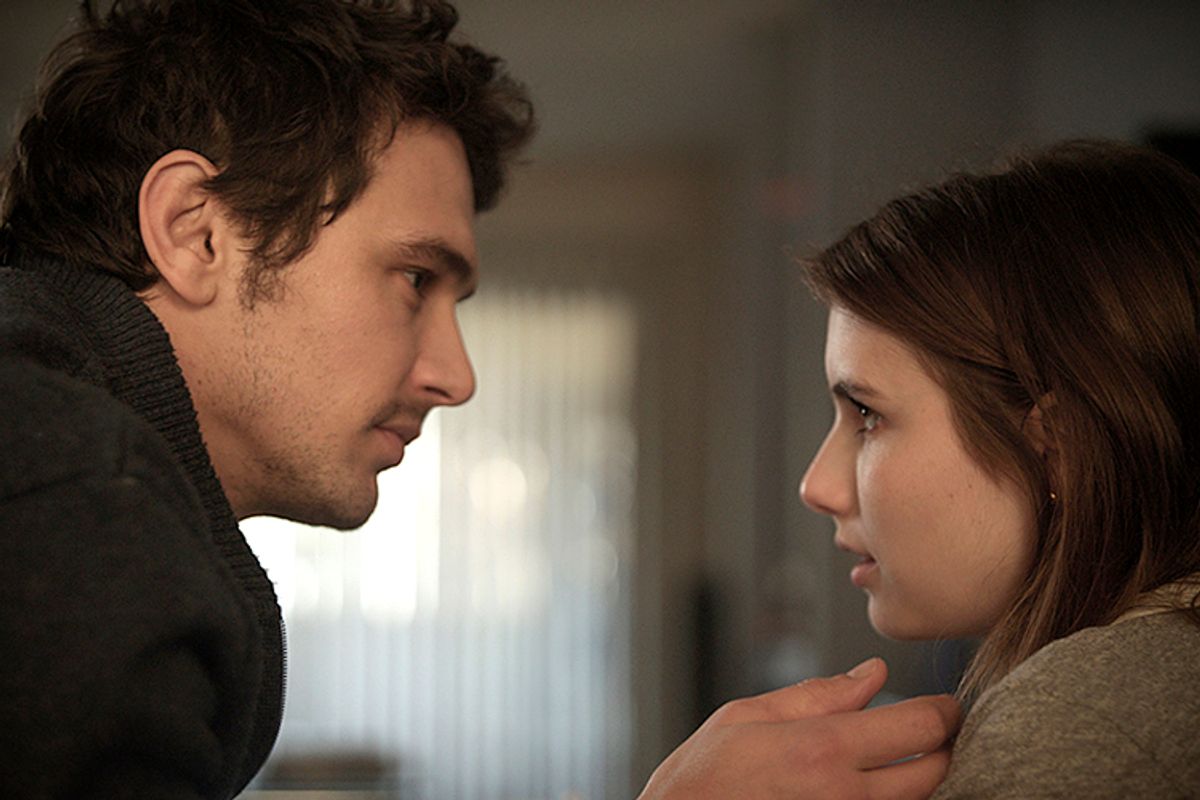So Gia Coppola is the granddaughter of “Godfather” director Francis Ford Coppola, and the niece of “Lost in Translation” director Sofia Coppola. She’s 27 years old, and her first film as a writer and director is “Palo Alto,” based on a collection of stories by James Franco, who also acts in the movie and helped produce it. There’s a considerable amount of privilege and entitlement baked into her young career, and haters, so they say, are gonna hate. But if you can get past whatever attitude you may have about all that, here’s the news bulletin: “Palo Alto” is a delicate tapestry of suburban gothic, romance and realism, with a surprising sweetness at its core and a wonderful star performance from Emma Roberts.
Roberts, of course, has a Hollywood pedigree of her own (daughter of Eric and niece of Julia) and attended the same exclusive girls’ school in Los Angeles as Gia Coppola, although she’s a few years younger. She’s been acting in movies and TV shows since she was 10 years old, but “Palo Alto” provides the clearest evidence to date that Roberts has matured into a real actress, not just a pretty girl who can throw attitude. (She’s also been good in several small indie films over the past few years, including “Adult World,” “Celeste & Jesse Forever” and “It’s Kind of a Funny Story.”) Amid the burned-out adults and precocious, faux-confident teens of this movie’s eponymous affluent suburb – a verdant enclave south of San Francisco, adjacent to Stanford University – April, Roberts’ character, stands out. She’s a little innocent for her jaded surroundings, a dreamy, introspective teenager whose longing for adult experience is balanced by the fact that she hasn’t quite let go of childhood.
This is one of the secret reasons we’re fascinated by stories about teenage life, and an aspect that Coppola captures perfectly. Teddy (Jack Kilmer), the likable, artistic, troubled kid with a huge crush on April and no idea what to do about it, still has pictures on the wall of himself at age 9 or 10, and sincerely loves doing his community-service gig at the local children’s library. Emily (Zoe Levin), the girl who has developed a possibly exaggerated reputation for giving indiscriminate blow jobs, has a bedroom still furnished with the frilly pink horse-themed décor of a 12-year-old. If teenagers stand on the edge of an unexplored and exciting new continent of love, sex, substance abuse and so-called independence, they still have one foot in a country none of us was ever quite certain we wanted to leave.
There’s nothing revolutionary about the wistful tale of young love deferred in “Palo Alto,” or in its ambiguous encounters between teenagers and the adult world. From Scott Fitzgerald to Larry Clark’s “Kids” to the underappreciated and wonderful “Myth of the American Sleepover,” these stories of childhood’s end inhabit strikingly similar terrain. But Coppola and cinematographer Autumn Durald create a compelling atmosphere of fog-shrouded mystery, capturing the sense of menace and malice, the urge toward self-destruction that lurks below the surface of what is in real life (and I can promise you this) a supremely boring town of rich, stoned white liberals. When Teddy goes over to his friend Fred’s house – as played by Nat Wolff, Fred is one of those mysteriously angry kids bound for a future as a genius, a deadbeat, a psychiatric patient or all three – Fred’s dad (a nice cameo for Chris Messina) gets him stoned and tries to hit on him.
Oh, and then there’s April’s entirely inappropriate relationship with her soccer coach, a single dad who frequently has her over to baby-sit and seems increasingly fixated on her. I suppose this was the obvious role for Franco to play, and yes, it inadvertently echoes the actor’s recent tabloidized contretemps with a 17-year-old. Whether this is odd or telling or whatever, Franco’s Mr. B is one of the movie’s weak links. All the teenage characters, even those like Emily and Fred who could easily have become caricatures, are compelling and complicated, their behavior at war with their desires. But Franco, ordinarily so good at portraying inner conflict, can’t do much with Mr. B, who seems like a smug, predatory hypocrite who only temporarily believes his claims that he loves April.
By moving Franco’s stories from the past into the present (his teen years in Palo Alto would have been the mid-‘90s), but without becoming unduly distracted by technology and social media, Coppola sets “Palo Alto” free from obligatory nostalgia, from the period hit songs so often inflicted in these kinds of movies. But she also doesn’t try to insist, in this lovely, textured, memorable debut film, that there’s anything especially contemporary about long nights of teenage vandalism, abstruse philosophical debates, misguided beverage combinations and ill-advised coupling. Those episodes of dark magic always seem momentous, meaningful and entirely unrepeatable when we’re personally involved, but other kids will come along to do it all over again the next year.
“Palo Alto” opens this week at the Film Society of Lincoln Center and the Sunshine Cinema in New York, and the Arclight Hollywood and the Landmark in Los Angeles. It opens May 16 in Boston, Chicago, Philadelphia, San Francisco, San Jose, Calif., Santa Cruz, Calif., and Washington; May 23 in Atlanta, Baltimore, Boulder, Colo., Dallas, Denver, Detroit, Houston, Madison, Wis., Minneapolis, Monterey, Calif., Nashville, Palm Springs, Calif., Phoenix, St. Louis, San Diego and Austin, Texas; and May 30 in Albuquerque, N.M., Charlotte, N.C., Davis, Calif., Hartford, Conn., Knoxville, Tenn., Muskegon, Mich., New Haven, Conn., Portland, Ore., and Santa Fe, N.M., with other cities and home video to follow.



Shares